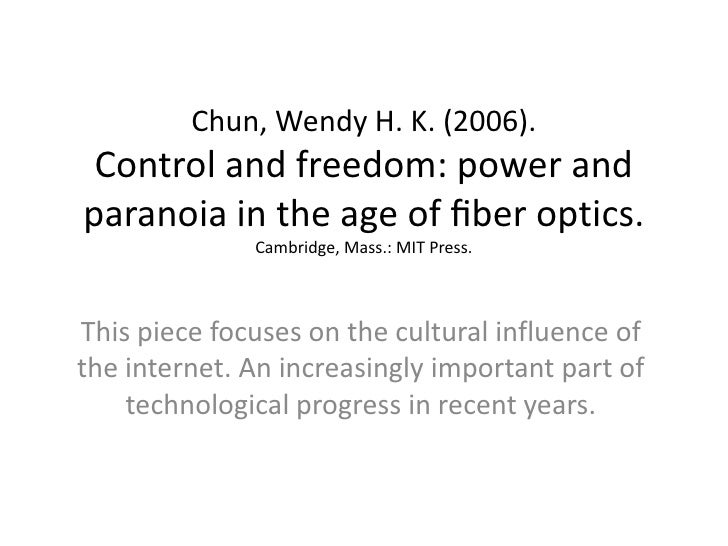Control and Freedom: Power and Paranoia in the Age of Fiber Optics (MIT Press)
Contents:
But can the ruins of Denver really be safe? And will the growing fire within allow me to stay there anyway? Write Blog Posts Readers Love: The ultimate step-by-step guide to writing popular blog posts with ease and confidence!
In Control and Freedom, Wendy Hui Kyong Chun explores the current political and technological coupling of Power and Paranoia in the Age of Fiber Optics. A work that bridges media archaeology and visual culture studies argues that the Internet has emerged as a mass medium by linking control with freedom and democracy. In Control and Freedom, Wendy Hui Kyong Chun explores the current political and technological coupling of freedom.
A novel set in a neoliberal dystopia. Review "Control and Freedom is the most theoretically rich, deftly written, and historically grounded treatment of race in cyberspace to date. Related Video Shorts 0 Upload your video. Share your thoughts with other customers. Write a customer review.
There was a problem filtering reviews right now. Please try again later. This theoretically-savvy but nonetheless highly readable book makes a provocative and vital intervention in the field of internet studies.
- Blades Of The Moritati (An Highly Irregular Adventure Book 1).
- Christian Singles: Wheres my mate?.
- The Catholic Apostolic Body, or Irvingites.
- !
- I Am Moore.
- True to the Old Flag?
It's a sharp and often stunning analysis that lays bare the ideological stakes of such notions as user-friendliness, protecting children, and techno-Orientalism -- a must-read for anyone interested in media archaeology or cyber-politics. Professor Chun's book interview ran here as cover feature on March 17, One person found this helpful 2 people found this helpful.
Wendy Hui Kyong Chun presents a compelling look at cyber-culture and the discipline of the control-freedom dynamic. She looks primarily at pornography and cyberpunk literature for her analysis, integrating the views of Foucault, Deleuze, Debord, and others. One person found this helpful.
- .
- .
- .
- Imaginative Horizons: An Essay in Literary-Philosophical Anthropology.
See all 3 reviews. Amazon Giveaway allows you to run promotional giveaways in order to create buzz, reward your audience, and attract new followers and customers. Learn more about Amazon Giveaway. Set up a giveaway. Customers who bought this item also bought. On the Surveillance of Blackness.
Citation Styles for "Control and freedom : power and paranoia in the age of fiber optics"
Pages with related products. See and discover other items: There's a problem loading this menu right now. Get fast, free shipping with Amazon Prime. Your recently viewed items and featured recommendations.
View or edit your browsing history. Get to Know Us. English Choose a language for shopping. Amazon Music Stream millions of songs. Amazon Drive Cloud storage from Amazon. Alexa Actionable Analytics for the Web.
Frequently bought together
AmazonGlobal Ship Orders Internationally. Amazon Inspire Digital Educational Resources. Amazon Rapids Fun stories for kids on the go. Control-freedom is the freedom perpetuated by the Department of Homeland Security: Such freedom is paranoid in the Lacanian sense: Real freedom, Chun insists, can never be reduced to control.
- Calvins Ladder: A Spiritual Theology of Ascent and Ascension.
- RCCS: View Book Info.
- Visions of the Multiverse.
- Forbes Guide to the Markets: Becoming a Savvy Investor.
Indeed, in exposing us to an alterity that threatens our own identity, the Internet offers us a valuable yet vulnerable freedom that is the opposite of control. Even when effective, agency is always compromised; to be an agent is to act but also to be acted upon. When we are online we are circulated, even disseminated, without our knowledge. There is no online interaction that does not leave traces. Accordingly, Chun urges us to understand agency as entailing dispossession as much as self-possession.
She convincingly relates the technical details of how the Internet works to larger theoretical issues. Methodologically, her work falls between the fields of visual cultural studies and media studies.

In terms of networked telecommunication technology, the former emphasizes software and the latter hardware. Media studies argues that the distinction between software and hardware is only ideological, and thus false. But Chun does not, like most writers within media studies, simply dismiss the persistent ideology of user control.
She seeks to expose it by understanding it.